|
|
|
Sort Order |
|
|
|
Items / Page
|
|
|
|
|
|
|
| Srl | Item |
| 1 |
ID:
112785
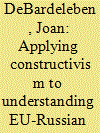

|
|
|
|
|
| Publication |
2012.
|
| Summary/Abstract |
The improved relations between Russia and the European Union (EU) in the 1990s were followed by a rise in tension since 1999. This article argues that constructivism can provide important insights into the basis of continuing difficulties. Drawing on the nature of the two actors, the author argues that the foreign policy identities of both actors are in a formative process, and thus the construction of inter-subjective meanings has the potential to be a particularly transformative element in the relationship. Both the Russian Federation and the EU are relatively new as regional and global actors, and both are in the process of forming their foreign policy identities, although in quite different contexts. Neither the EU nor Russia has developed a strategic conception for the relationship, and political discourse often obstructs communication rather than furthering the generation of inter-subjective meanings. The article argues that a constructivist analysis can help to expose the deep interconnections between normative disagreements, conflicting constructions of interests and differing concepts of governance.
|
|
|
|
|
|
|
|
|
|
|
|
|
|
|
|
| 2 |
ID:
112784


|
|
|
|
|
| Publication |
2012.
|
| Summary/Abstract |
Russia's approach to sovereignty reflects a close linkage between the recentralizing project domestically, and reassertion of Russia's position as a great power on the international scene. This article assesses the relative utility of constructivist and realist approaches in Russian readings of sovereignty. A constructivist approach is found to be more useful in treating sovereignty - it directs our attention toward the problem of developing a new post-Soviet identity, the role of culture and historical interpretation in foreign policy, Russian concepts of the hostile Other and domestic ideas linked to Russian concepts of federalism - all critical factors in understanding Russian foreign policy behavior. The major ideological construct of the post-communist period - sovereign democracy - insists that both sovereignty and democracy are socially and culturally determined, and therefore clash with Western interpretations of these concepts. The emergence of a new, post-modern and Western-dominated set of global norms limiting sovereignty is closely linked to continued tensions between Russia and the West.
|
|
|
|
|
|
|
|
|
|
|
|
|
|
|
|
| 3 |
ID:
112789
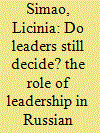

|
|
|
|
|
| Publication |
2012.
|
| Summary/Abstract |
This article looks at Russian foreign policy from the perspective of the individuals responsible for decision making. The focus on the individual level of analysis aims to shed light on the evolving dynamics of Russian foreign policymaking and complement existing analysis on the role of ideas, world views and influential groups in foreign policy analysis, with insights from neo-classical realism and constructivism. Whereas the former sees the state as the transmission belt between international power distributions and political action, the latter underlines the roles of ideas and norms to explain agency. In this context, the article is well placed to deal with the evolving relationship between leaders' views and situational constraints, including other actors involved in setting foreign policy priorities and the external environment. How are decisions taken in the context of Russia's foreign policy under President Putin and Medvedev? What is the role of the presidents from both a legal (constitutional) and a practical perspective? The article maps Russian political leaders' decisions, under Putin and Medvedev, using two case studies: Putin's decision to support the US-led post-9/11 war on terror and Medvedev's decision to go to war with Georgia in 2008.
|
|
|
|
|
|
|
|
|
|
|
|
|
|
|
|
| 4 |
ID:
112792
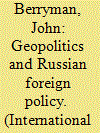

|
|
|
|
|
| Publication |
2012.
|
| Summary/Abstract |
The article provides a broad overview of the fluctuating connections between the controversial and ambiguous field of modern geopolitics and Russia. Given the pivotal significance of the Russian challenge within the early hypotheses of Mahan and Mackinder, the article first explores those distinctive geographical and spatial considerations that helped shape the development of the Russian Empire. The place of geopolitics in the Cold War is then reviewed, including both its policy orientation and the exchanges between the proponents of geopolitical realism and liberal internationalism. In conclusion, the article examines the post-Cold War renaissance of geopolitics, reviewing both theoretical developments and policy implications for Russian foreign policy.
|
|
|
|
|
|
|
|
|
|
|
|
|
|
|
|
| 5 |
ID:
112790
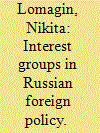

|
|
|
|
|
| Publication |
2012.
|
| Summary/Abstract |
Among the domestic interest groups that play a role in influencing Russian foreign policy the Russian Orthodox Church has become an important actor. Its most important role has been that of supporting the emergence of a new nationalist Russian identity to undergird Russian policy. On specific policy issues, it has advocated the political reunification of Eastern Slavic Orthodox peoples, the emergence of a multipolar international system and the restatement of traditional values as the foundation for the pursuit of global human rights.
|
|
|
|
|
|
|
|
|
|
|
|
|
|
|
|
| 6 |
ID:
112787
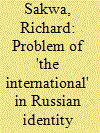

|
|
|
|
|
| Publication |
2012.
|
| Summary/Abstract |
A new era in international politics is gradually taking shape in which the legacy of the Cold War is gradually fading, but in which new lines of division are emerging. The major institutions of the Cold War period are undergoing a long decay although the political processes associated with them are becoming increasingly dysfunctional. New forms of multi-polarity are taking shape accompanied by the struggle between defenders of the status quo and those ready to adapt to the structural revisionism inherent in the new pattern of international politics. In all of this, Russia acts as the bellwether, developing as a distinct and separate pole in the international system rather than joining the Western constellation, as was anticipated after the end of the Cold War. Russia's great power identity in the international system is accompanied by domestic systemic specificities, which reinforce differentiation at the structural level. Russia's neo-revisionism does not repudiate the present balance in international order, but seeks to create what it considers to be a more comprehensive and equal system. This can be seen in its various forms of interaction and modes of engagement with 'the international'. In methodological terms, the attempt to analyse these changes through a Cold War lens is a categorical error that perpetuates anachronistic paradigms. By disaggregating Russia's engagement with the international into a number of distinct processes, we can delineate more clearly the interaction of structural and systemic factors that sustain Russia's neo-revisionism.
|
|
|
|
|
|
|
|
|
|
|
|
|
|
|
|
| 7 |
ID:
112783


|
|
|
|
|
| Publication |
2012.
|
| Summary/Abstract |
Throughout the Cold War, studies of Soviet foreign policy were generally 'atheoretical'. In so far as they were based on theoretical models from international relations, those models tended to be some version of 'realism' or 'neorealism'. Over the past two decades, since the end of the Cold War, other approaches - especially those based on 'constructivism' - have challenged the domination of the 'realist' framework in studies of Russian foreign policy. The articles in this special issue of International Politics examine the strengths and weaknesses of the various theoretical frameworks employed to explain Russian policy.
|
|
|
|
|
|
|
|
|
|
|
|
|
|
|
|
| 8 |
ID:
112788


|
|
|
|
|
| Publication |
2012.
|
| Summary/Abstract |
Russian foreign policy is both an expression of Moscow's internal political dealings around the presidential administration and the bureaucracies that support it, with their focus on the shaping and making of foreign policy, as well as its implementation, which is grounded in Russia's stated goal of its reassertion in the international system as a major power. This is a process that is embedded in continuous interaction between different levels of agency and the construction of understandings and perceptions, both at the domestic and the international level. Looking at foreign policy as a process, the article argues that the study of foreign policy should go beyond strictly positivist assumptions, as relations between the different actors and the foreign policy approaches that these suggest are embedded in structural, material and ideational dimensions. Departing from this conceptual frame, the article looks at Russian foreign policy, seeking to understand how the internal/external linkages take place in the process of policy construction, looking in particular at socialisation processes and normative adaptation.
|
|
|
|
|
|
|
|
|
|
|
|
|
|
|
|
| 9 |
ID:
112786
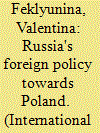

|
|
|
|
|
| Publication |
2012.
|
| Summary/Abstract |
Russia's relations with Poland in the post-Soviet period have been greatly affected by their divergent historical narratives that have shaped their dominant identities and have been further promoted by the political elites to maintain these identities. However, Moscow's attempts to project a more positive image in Poland in recent years have involved re-articulating some elements of the official narrative. Drawing on social constructivism, this article presents a theoretical framework that can be applied to an analysis of Russia's foreign policy, and illustrates its benefits by examining Russia's policy towards Poland.
|
|
|
|
|
|
|
|
|
|
|
|
|
|
|
|
| 10 |
ID:
112791


|
|
|
|
|
| Publication |
2012.
|
| Summary/Abstract |
This essay presents the argument that analysts, crystal ball readers and general future-tellers generally should to a much higher extent rely on claimed interests of great powers than on resources alone in predictions of future behaviour of great powers. Analysts should analyse what states want to do given what they could do, as much as analyse what states could do based on their resources, or analysts should analyse state policy intentions as much as state policy resources.
|
|
|
|
|
|
|
|
|
|
|
|
|
|
|
|
|
|
|
|
|